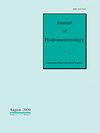Multi-product characterization of surface soil moisture drydowns in the UK
IF 2.9
3区 地球科学
Q2 METEOROLOGY & ATMOSPHERIC SCIENCES
引用次数: 0
Abstract
Abstract The persistence or memory of soil moisture (θ) after rainfall has substantial environmental implications. Much work has been done to study soil moisture drydown for in-situ and satellite data separately. In this work, we present a comparison of drydown characteristics across multiple UK soil moisture products, including satellite-merged (i.e. TCM), in-situ (i.e. COSMOS-UK), hydrological model (i.e. G2G), statistical model (i.e. SMUK) and land surface model (LSM) (i.e. CHESS) data. The drydown decay time scale (τ) for all gridded products are computed at an unprecedented resolution of 1-2 km, a scale relevant to weather and climate models. While their range of τ differ (except SMUK and CHESS are similar) due to differences such as sensing depths, their spatial patterns are correlated to land cover and soil types. We further analyse the occurrence of drydown events at COSMOS-UK sites. We show that soil moisture drydown regimes exhibit strong seasonal dependencies, whereby the soil dries out quicker in summer than winter. These seasonal dependencies are important to consider during model benchmarking and evaluation. We show that fitted τ based on COSMOS and LSM are well correlated, with a bias of lower τ for COSMOS. Our findings contribute to a growing body of literature to characterize τ, with the aim of developing a method to systematically validate model soil moisture products at a range of scales.多产品表征的表层土壤水分干燥在英国
降雨后土壤水分(θ)的持续或记忆具有重要的环境意义。对土壤水分干枯的研究已经做了大量的工作。在这项工作中,我们比较了多个英国土壤湿度产品的干燥特征,包括卫星合并(即TCM)、原位(即COSMOS-UK)、水文模型(即G2G)、统计模型(即SMUK)和地表模型(LSM)(即CHESS)数据。所有网格产品的干燥衰减时间尺度(τ)以1-2公里的空前分辨率计算,这是一个与天气和气候模式相关的尺度。虽然它们的τ范围不同(除了SMUK和CHESS相似),但由于感知深度等差异,它们的空间格局与土地覆盖和土壤类型相关。我们进一步分析了COSMOS-UK站点干缩事件的发生。我们表明,土壤水分干燥制度表现出强烈的季节依赖性,即土壤在夏季比冬季干得更快。在模型基准测试和评估期间,考虑这些季节性依赖关系是很重要的。我们发现基于COSMOS和LSM的拟合τ具有良好的相关性,COSMOS的偏倚较低。我们的发现有助于越来越多的文献描述τ,目的是开发一种方法来系统地验证模型土壤湿度产品在一定范围内的尺度。
本文章由计算机程序翻译,如有差异,请以英文原文为准。
求助全文
约1分钟内获得全文
求助全文
来源期刊

Journal of Hydrometeorology
地学-气象与大气科学
CiteScore
7.40
自引率
5.30%
发文量
116
审稿时长
4-8 weeks
期刊介绍:
The Journal of Hydrometeorology (JHM) (ISSN: 1525-755X; eISSN: 1525-7541) publishes research on modeling, observing, and forecasting processes related to fluxes and storage of water and energy, including interactions with the boundary layer and lower atmosphere, and processes related to precipitation, radiation, and other meteorological inputs.
 求助内容:
求助内容: 应助结果提醒方式:
应助结果提醒方式:


